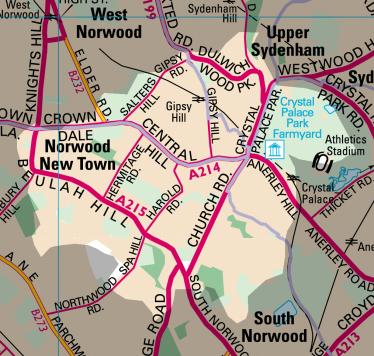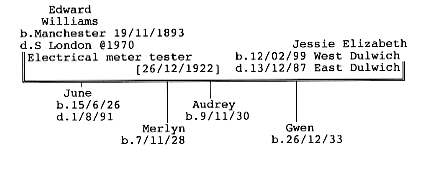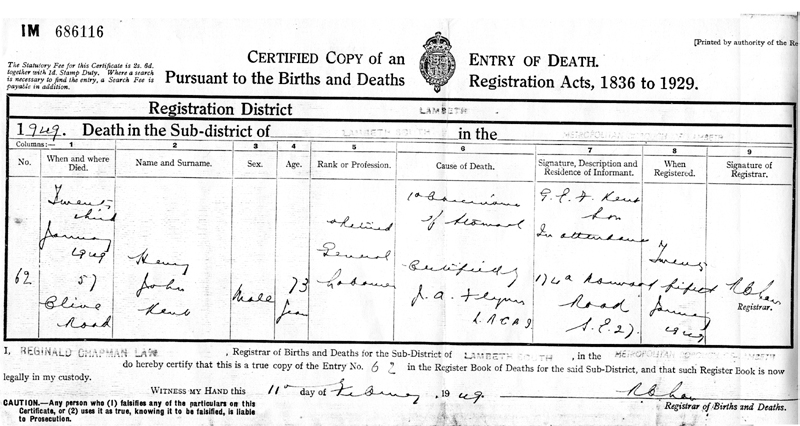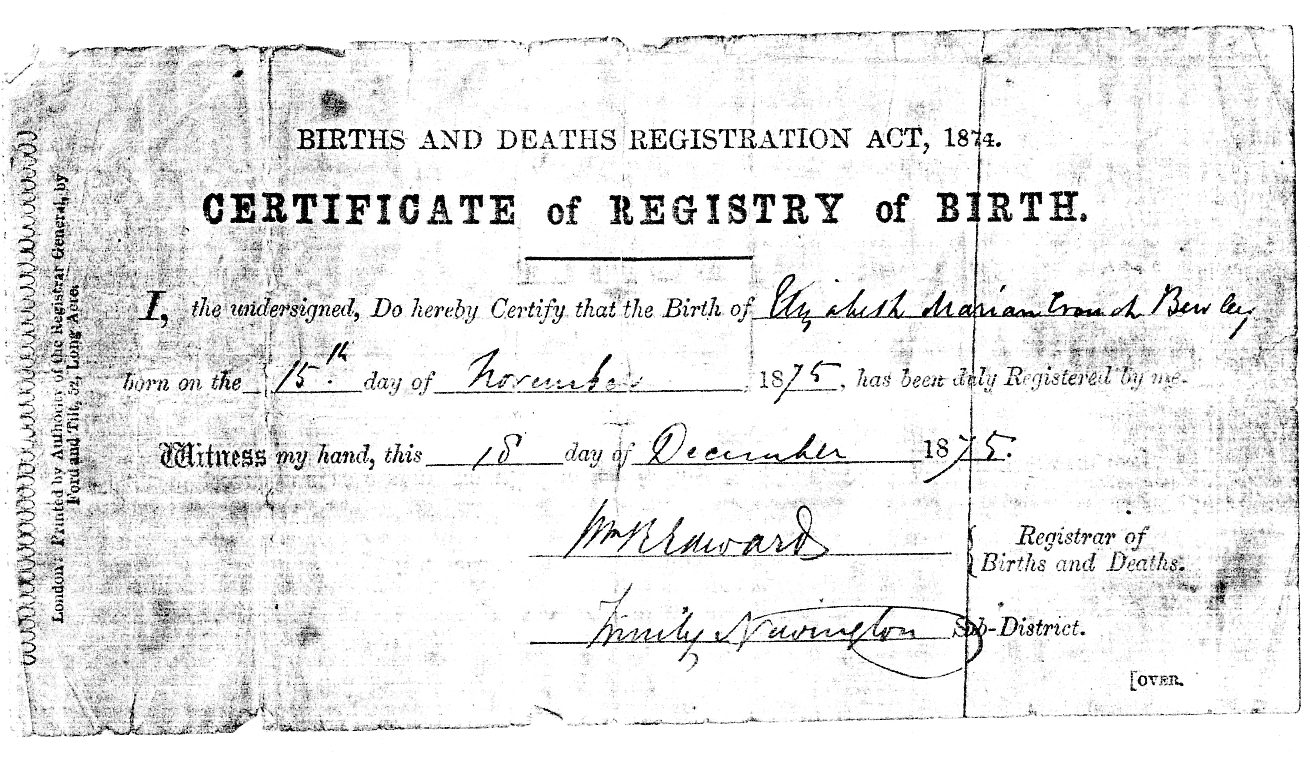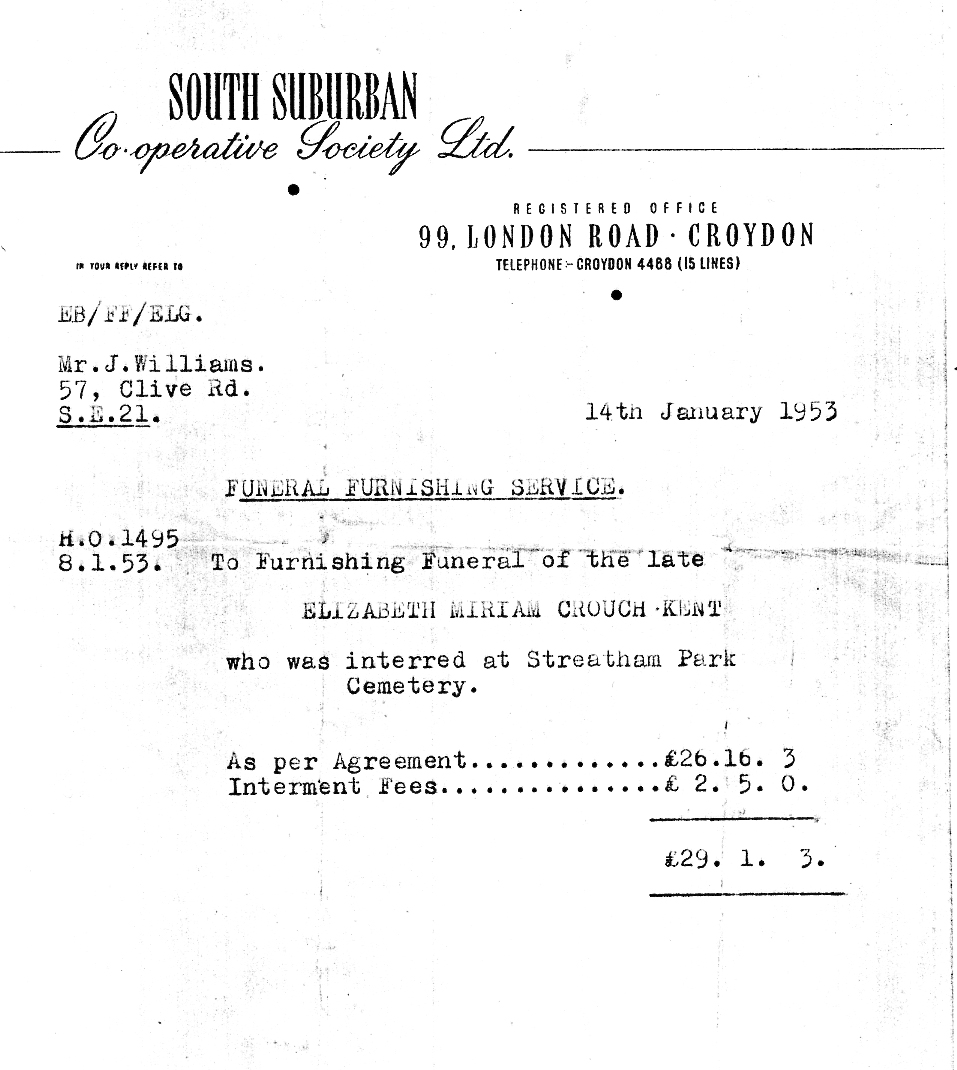|
Edward Williams met his wife to be, Jessie Kent, at TMC (Telephone Manufacturing Company) in Tritton Road, a turning off Clive Road. They both worked there during the First World War. "My Dad had been invalided out of the army and my Mum was working there," my Mum told me. "Half the people in Norwood worked there at one time. My Mum was putting Dope (possibly a cellulose type paint) on the wings of aeroplanes. My Dad was always very good with his hands. He may have been involved in aeroplane making." Mum doesn't know how her father met her mother but says: "Mum was the eldest of four or five girls. There was always a crowd of them." Perhaps they just met up, she suggests.
Edward & Jessie courted for a long time before they got married and they were married for four years before they had their first daughter, June, who had a stillborn twin. Marian was not the midwife when my mother Merlyn was born (at 10 o clock at night). Jessie hated the midwife, for some reason.
Jessie Kent's father (Henry John Kent) tried to talk her out of marrying Edward Williams because of his health. Doctors said Edward only had about a year to live. "She said 'never mind if I can have him for a year, I will'," my Mum told me.
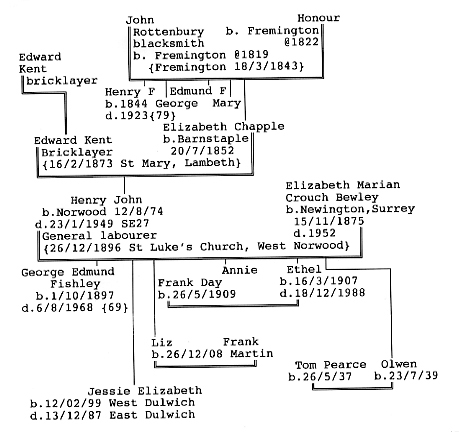
Edward & Jessie moved in with her parents at 57 Clive Road, a three bedroom house containing grandfather, grandmother, mother, father and four daughers. There was one sink, one tap and no hot water.
The tenancy was in the name of Henry John Kent (grandfather). My Mum says: "When grandfather died, which was just before we were married, they swapped the lease to grandmother. When grandmother died they wouldn't swap the tenancy again so mother and father were evicted. They got a flat in Canterbury Grove through the council because the council had taken over unoccupied premises. They (her parents) were actually council tenants though it wasn't council property and they were there till my father died."
Clive Road only had an outside loo (a privy) and no bathroom. It had a big garden in which grandfather grew a lot of herbs
The plumbing was extremely basic and there was no running water upstairs. "My father paid for the electricity to be put in," said Mum. "We had gas only until I was about 10. ...the landlord point blank refused to do anything."
The agents, who may have been Montague F Long or Veriyard & Yates, claimed that they had no power to do anything but collect the rent because the property was in Chancery, the subject of a dispute about a will. The rent was 15s a week (75p). "Bear in mind my father was earning about £3 so it was a considerable rent," said Mum.
The house no longer exists. It was demolished in the 1980s or early 1990s. Mum lived there from the day she was born until she got married, except when she was evacuated during the war. "I was only about 12 if that," she said. "We went to Ditchford in Gloucestershire... June must have been 14 and they wouldn't let her go to (the local school)...I went there for a while...
Ditchford was a tiny hamlet, consisting of a farm, a pub and a few cottages. They lived in one of two cottages in the middle of a field. Mum recalls that they got billeting money, so it wasn't totally unauthorised. "My uncle Tom found an empty cottage in the middle of a field," she said. "My Aunt Olwen and the three boys they had then, and my mother went down by train and then we got a lift from the station (Moreton in the Marsh) on a big lorry."
There were two women, seven small children in a cottage which had no water, no electricity, no gas, no anything. "We had to pump the water," she said. "The pump was on the sink in the house."
"The funny thing is that the people who lived in the next door cottage their name was Kent," Mum said. "They were evacuees too."
The Education authorities were not happy about the arrangement saying that June should have been attending school at Stratford on Avon.
"The education authority said they would give us bicycles but my mother said no way would we bicycle 14 miles there and back," Mum says. "So we were then sent to Reigate." At Reigate there was a proper Grammar School but they didn't get on with the locals. Mum says they were "too insular".
"They didn't like us being there," she said. "They used to call us 'them refugees'. They wouldn't let us have sweets in the shops. They used to say 'they're for local children'. "The people I stayed with the woman was a bitch, (Mrs Snashfold). She hated kids. She didn't want any and she didn't want us."
Honour Oak, the West Norwood school, moved to Reigate County Girls where the two schools shared facilities. Both schools had to offer part time education. "We had to go all day Saturday and got all day Monday off," Mum said. "In summer we used to have a lot of lessons out on the grass." Later the school took over a large house called Rosemead and the evacuees went there for lessons.
Mum became ill: "I was taken to hospital and when I came out of hospital my mother came and took me and I went home and then June moved in and stayed the rest of the war. They said I was suffering from malnutrition... I was the thinnest girl in the school in those days... I used to pass out in lessons... we were so appallingly badly fed... they would give us a bowl of cereals for breakfast and then they'd give us bread and jam for tea and of course we had disgustingly awful meals (for lunch) it was uneatable." The people who were supposed to look after them thought they were getting a proper meal at lunch and therefore skimped on the other meals.
When Mum returned home she went back to her own school now run as the South London Emergency School. "I stayed there until I was 17," she said, "when we had the buzz bombs and the rockets... I did school certificate during a buzz bomb raid, doodlebugs... We spent more time in shelters than we did in the classroom we became experts at all the pencil games."
The shelter was a bricked up classroom on the ground floor which had been made as safe as it could be.
After the sisters returned home the school transferred from Reigate to Ebbw Vale but their mother wouldn't hear of them going there.
Audrey passed her scholarship and started at Honour Oak and Gwen followed, though that may have been after the War.
"There had been other families where four had passed but we were the first family where all four had passed the scholarship and there were only the four," she said. "There was a bit in the paper, my mum kept it for years."
June made the front page of the Norwood Press and Dulwich Advertiser of January 24, 1941, with a letter she sent home. |
